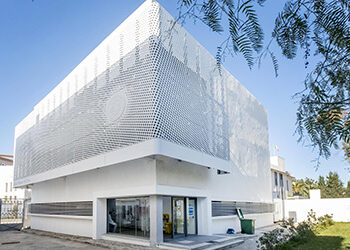News
Opening of the Rodolphe Mérieux Laboratory, a level 3 biosafety laboratory, at the Institut Pasteur in Tunis

© Nicolas Fauquet
The high-security level 3 biosafety Rodolphe Mérieux Laboratory of Tunisia was opened on Wednesday 27 October 2021 at the Institut Pasteur de Tunis (IPT). This represents a unique acquisition in Tunisia and is one of only a few laboratories in Africa.

© Institut Pasteur in Tunis
The opening ceremony was attended by Hechmi Louzir, Managing Director of the Institut Pasteur in Tunis; Alain Mérieux, President of the Mérieux Foundation; André Parant, French Ambassador; Yves Souteyrand, WHO representative in Tunisia; Moncef Boukthir, Minister for Higher Education and Research; Ali M’Rabet, Minister of Health; and Halima Mahjoubi, Vice-President of the University of Tunis El Manar.
The laboratory is part of the network of Rodolphe Mérieux Laboratories. Having received a request for the funding and construction of the laboratory, the Mérieux Foundation made a donation to the Institut Pasteur in Tunis and to Tunisia.This will allow the isolation of highly pathogenic agents (tuberculosis, rabies, etc.), as well as potential emerging or re-emerging viruses such as West Nile, Ebola, etc.
The laboratory represents a valuable acquisition for the Institut Pasteur and for Tunisia. It will allow the fulfilment of international safety and quality standards, further developing health research and making it more effective and competitive.
The centre will reinforce the methods in place for controlling epidemics in the country and in the region and will help to respond to national public health requirements in terms of diagnosis and biological monitoring.
The infrastructure of the Rodolphe Mérieux Laboratory in Tunisia covers an area of 132m² and meets international biosecurity and level 3 biosafety requirements. It will allow the fulfilment of high-tech biomedical analysis procedures, provide training for health professionals particularly in the field of medical biology, and contribute towards dealing with public health issues in Tunisia, particularly in the field of infectious diseases.
The Rodolphe Mérieux Laboratory has already been put to good use by Tunisia and the IPT in the context of the COVID-19 pandemic. The IPT has carried out the great majority of RT-PCR COVID-19 tests in Tunisia (more than 100,000 since March 2020) and has set up a biobank that will help with other areas of virology research.

© Institut Pasteur in Tunis
Quotes
Hechmi Louzir, Managing Director of the Institut Pasteur in Tunis: “This laboratory represents an invaluable acquisition for the Institut Pasteur in Tunis and for Tunisia, helping us to fight infectious diseases and control pandemics.”
Alain Mérieux, President of the Mérieux Foundation: “Tunisia is a country that is very close to my heart. We are proud to be able to support the Public Health activities carried out by the Institut Pasteur in Tunis and Tunisia.”
André Parant, French Ambassador to Tunisia: “This new laboratory will enhance the cooperation between France and Tunisia in the area of Healthcare.”
Moncef Boukthir, Minister for Higher Education and Scientific Research: “This new acquisition will strengthen the position of the Institut Pasteur in Tunis as a Centre of Excellence in the field of scientific research and collaboration with research centres in France.”
Ali M’Rabet, Health Minister: “This laboratory, which has already proven its crucial contribution towards managing the Coronavirus epidemic in Tunisia, will be an absolute gem when it comes to serving Public Health.”
About the Rodolphe Mérieux Laboratories, high-performance structures in infectious disease hotspots
Dedicated to applied biological research in infectiology and to epidemiological surveillance, Rodolphe Mérieux Laboratories are built by the Mérieux Foundation and then handed over to local operators in order to guarantee the relevance and long-term effectiveness of their actions. They contribute towards structuring local research and training capacities and to providing clinical and biological analyses in their local regions. To date, 14 laboratories have already been constructed or are currently being set up in Africa, Asia, the Middle East and Latin America.
About the Institut Pasteur in Tunis
The IPT, a public health institution, is the only institute in Tunisia to combine research and training activities, diagnosis and public health, and vaccine production. These missions are closely interlinked and make the IPT a leading structure in the field of biomedical research.
The IPT has been directed by Professor Hechmi Louzir since 2007. Under his leadership, a restructuring programme has been launched. This restructuring aims to ensure better visibility for the IPT in Tunisia and worldwide, as well as an extensive quality programme and the reinforcement and reorganisation of diagnosis and public health activities, research & development and the production of certain vaccines and therapeutic serums.
Research staff come from a range of disciplines (biologists, hospital and university research staff, public health doctors, veterinarians), with more than a hundred scientists and over 150 students.
The fields of research are:
- Epidemiology of infectious diseases;
- Immunology of infectious diseases in humans and animals;
- Study of diseases caused by a genetic and/or immune deficiency;
- Biochemistry/immunology of venoms and toxins;
- Biotechnological development.
